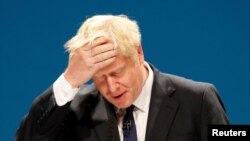Both candidates to succeed Theresa May as Conservative leader and Britain’s next prime minister are now laying the political groundwork for a so-called “hard Brexit” — and are ready to leave the European Union without any withdrawal deal, an outcome independent observers and analysts warn could poison relations between Britain and its European neighbors for decades.
The exit Boris Johnson and his rival Jeremy Hunt, the country’s current foreign minister, are plotting would likely involve Britain withholding all or some of the $50 billion the country already agreed formally it would owe the EU for past financial obligations on exiting.
Johnson, the frontrunner, former London mayor and onetime journalist, is turning to hardline Brexiters in his party to draw up his plans and says the withdrawal agreement Theresa May struck with Brussels last November, and which she failed three times to get approved by a deadlocked House of Commons, is dead.
His rival is also hardening his Brexit rhetoric in what is turning into a ‘bidding war’ between the contenders as they vie for the votes of the 160,000 Conservative party members who will choose between them. The party members are being balloted by mail with the result scheduled for July 22. In recent months the party has seen a wave of new members with an estimated 30,000 new recruits being dubbed ‘Brexit entryists.’
On Sunday Hunt said in a newspaper interview that he wants “to change the withdrawal agreement” but if it isn’t possible, “I’ll take us out without a deal.” In a no-deal exit Hunt would withhold about half of the withdrawal money already agreed between London and Brussels. “Anyone who thinks I am going to write a blank check to the European Union is sorely mistaken,” he said.
Hunt has recruited the former Canadian Prime Minister Stephen Harper to lead his Brexit team, if he wins the keys to Downing Street, to help him to try to negotiate a free-trade deal with Brussels along the lines of the one agreed after seven years of talks between Ottawa and the EU.
But such a deal would only cover the trade in goods and not in services, which account for 79 percent of Britain’s economic output.
“Stephen Harper knows how you negotiate trade deals with both the EU and the U.S.. He’s got the T-shirt,” Hunt said.
The hardline positions being crafted by Johnson and Hunt would put whoever is elected on a collision course with Brussels and the national leaders of the EU 27. The French government warned both candidates Saturday that the divorce deal May brokered with EU is not up for renegotiation, echoing warnings from Brussels and across the continent all last week.
“If the United Kingdom wants to leave the union and to leave in an orderly fashion, the deal on the table is the deal we negotiated over two years,” France's newly appointed European Affairs minister Amelie de Montchalin told the Anglo-American Press Association of Paris. “To reopen the withdrawal agreement, the position of the Council [of EU leaders] is very clear, it's: 'no'," she added.
May’s premiership was wrecked after she failed to get her Brexit deal approved by the British parliament — the agreement is unpopular with both hardline Brexiters, who say it keeps Britain too closely tied to the bloc, and by Europhiles, who favor greater participation in the EU. She was forced to delay, with reluctant EU agreement, the deadline for Britain’s departure, to October 31.
EU national leaders and senior officials in Brussels have insisted for months that there can be no renegotiation of the withdrawal deal, although they say they are amendable to amending an accompanying political declaration outlining in more detail Britain’s possible future trade relationship with the bloc, which will be negotiated following Brexit.
May herself has warned her possible successors that they will face the same political impasse she did, as well as a parliament determined to block Britain leaving the EU without a withdrawal deal, which is designed to limit the economic pain Brexit will cause on both sides of the English Channel.
Neither Johnson nor Hunt have outlined what the trade-offs would be, if Britain left without a withdrawal agreement, say Conservative critics and EU officials. “Johnson’s sole contribution to the conversation about the difficult trade-offs involved in Britain’s most important political challenge since the Second World War has been a reheating of his two-decade-old adage: ‘My policy on cake is pro having it and pro eating it,’” said Matthew Parris, a former Conservative lawmaker and now a columnist at The Times of London.
Both Britain and the EU — especially the near neighbors of Ireland, France, Belgium and The Netherlands — would be hurt economically by a no-deal and the reimposition of trade barriers and tariffs between the bloc and Britain.
According to a study by the University of Leuven in Holland, there will be close to two million job loses across the continent as a result of a no-deal Brexit. With Germany possibly losing nearly 300,000 jobs as a result. But the biggest immediate impact would likely be felt in Britain, which could see more than half-a-million jobs lost and the country’s GDP take a 4.4 percent, according to the study. Bank of England economists have predicted a recession in Britain, if there is a hard Brexit.
Johnson’s supporters say such studies should give Brussels pause and will convince EU leaders to cave to British demands.
EU officials fear both Conservative candidates — especially Johnson — are backing themselves into a corner in a competition of political machismo. Johnson is stating unequivocally that he will, if in Downing Street, lead Britain out of the EU on October 31, deal or no deal, pledging to do so “do or die.” Hunt has allowed himself some wiggle room, saying the deadline could be passed if there is a chance of a new deal.






